ECOMMERCE
4 Online Shop Platforms We Can Recommend in 2022
01.09.2022

There are now between 12 and 24 million online shops. These are spread across the best ecommerce platforms and the most diverse industries as well as company sizes. You will inevitably come across names like Magento, WooCommerce, Shopify and many more when you are looking for your own suitable online shop system.
But which ecommerce platform is the best for your SME?
What is an ecommerce platform?
An ecommerce platform is an end-to-end software solution that enables online merchants to manage their business. This type of service includes ecommerce website builders, accounting and inventory management systems, and customer service infrastructure.
Open source, plug-ins or rather SaaS - What types of ecommerce platforms are there?
To create an overview in the first step, we divide the ecommerce platforms into four categories:
-
Open Source: These online shop systems are completely free and are managed and developed by numerous people around the world. Usually, you can find a lot of documentation and blog posts for them to help you build your store.
Examples of open source: Magento, PrestaShop, Wix, odoo, BigCommerce, Shopware 6 -
On-premise (purchased software): With so-called on-premise solutions, the licenses for a software are purchased. If you purchase software, then the maintenance and backup of the data is solely in your hands. On-premise solutions therefore tend to appeal to larger companies and often require more budget for setup and maintenance.
Examples for on-premise: xanario, mondo media, cosmoshop, Magento 2 -
SaaS solutions (rental software): SaaS stands for "Software as a Service". SaaS webshop solutions are hosted externally. This means that you don't need your own servers or a great deal of IT knowledge. SMEs are therefore increasingly turning to SaaS solutions and don't have to worry about IT issues. In this case, however, the individualization of the software is more limited than with open source software, for example.
Examples of SaaS solutions: Shopify, lightspeed, Jimdo, Shopware 6 -
Extensions (plugins): CMS extensions such as WooCommerce (a webshop plugin for the very popular WordPress content management system) are an alternative, especially for small online shops. With these plugins you can easily add store functionality to your current website.
Examples for plugins: WooCommerce, wpShopGermany, VirtueMart, Ecwid
To help you choose, we've compared the 4 best ecommerce platforms for SMBs, along with their advantages, disadvantages, and prices. Here is a comparison of the individual store systems:
Shopware
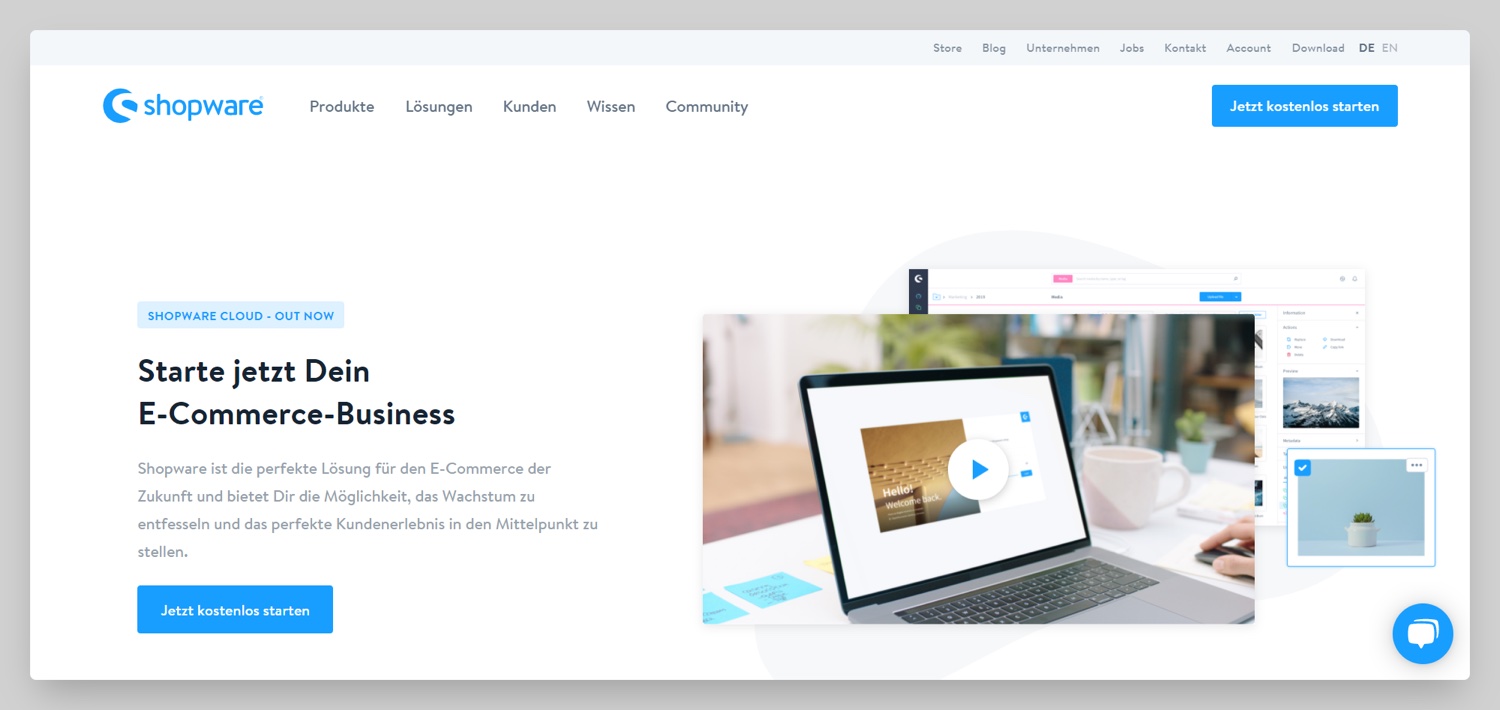
Description
Shopware has been completely modernized with version 6 and with the Starter Edition you already create a good basis for your webshop. However, Shopware 6 still has some catching up to do, especially when it comes to internationalization ambitions outside of Europe.
Pricing
- Starter Edition: free of charge
- Professional Edition: from € 199 / month or € 2,495 one-time fee
- Enterprise Edition: on request
Advantages
- large community that provides for creative enhancements
- integrated plugin manager
- Developed together with store operators
- German product for the German market
- Small budget necessary
Disadvantages
- expensive plugins
- Internationalization not mature
Recommended for
- online shops for the Austrian and German market
- Stores with low budget
Shopify
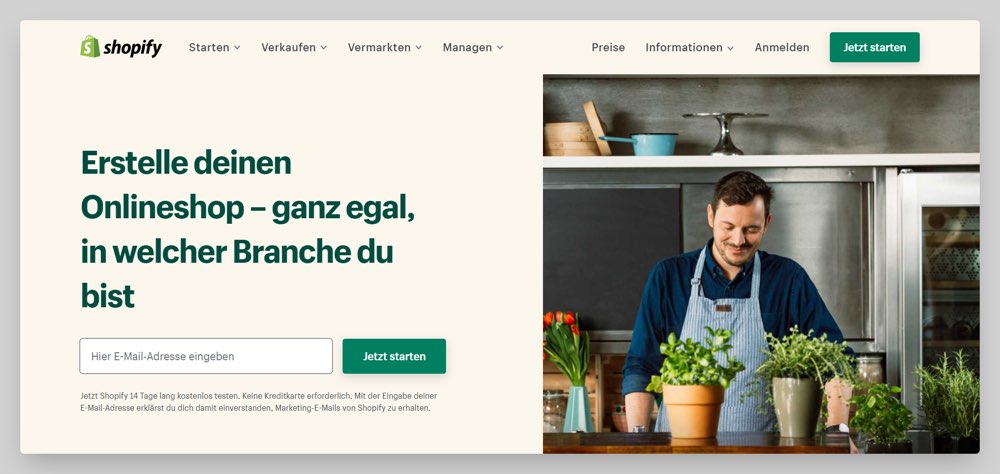
Description
Setting up an appealing online shop with Shopify is relatively easy. Through Shopify, you have the option to buy a domain name right away and then start setting up your webshop. For this purpose, more than 60 themes are provided (unfortunately, a few of them are payable), so that you can customize your store to your requirements.
Pricing
- Basic Shopify: $ 29 (~ € 25) / month
- Shopify: $ 79 (~ € 66) / month
- Advanced Shopify: $299 (~ € 250) / month
Advantages
- If you use Shopify you will never be alone - a large community offers you support and new solutions.
- Analysis Dashboard
- many plugins
- an additional comprehensive cash register system (which you can also use in real stores)
Disadvantages
- no free version
- Less customization options than other platforms
Recommended for
- small to medium sized webshops
- all industries
- Companies thatwant to sell physical and digital products through Shopify
Did you know: customers with Shopify store can directly add their product catalog via URL in boomerank to import their product feed and quickly find matching keywords for SEO & SEA actions.
WooCommerce
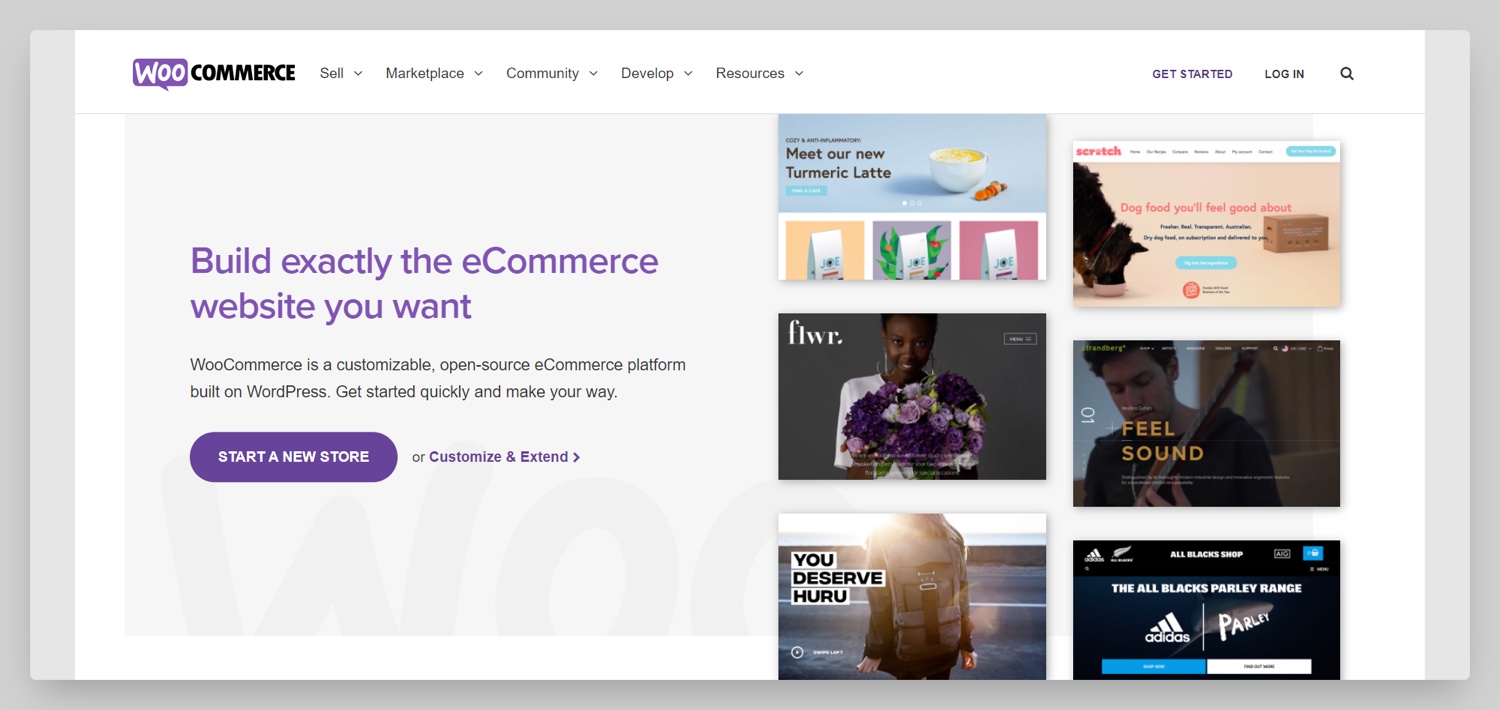
Description
WooCommerce is a plugin and therefore not an ecommerce platform per se. To use WooCommerce, you also need a WordPress website. WordPress itself is open source and therefore free. Note, however, that you will have to pay for domain name and hosting. However, these costs are manageable and you can get a domain including hosting from about 5 € per month.
Pricing
Basically, WooCommerce is also free, but you need additional plugins to build your online shop (these can cost between 25 € and 100 €). Also, WooCommerce already offers some themes for free, but the more creative and individual ones cost something (mostly between 40 € and 60 €).
Advantages
- large online community
- many different plugins (e.g. for dropshipping)
- no obligation to buy domain/hosting from specific provider
- No limits on how many products are listed
Disadvantages
- You need WordPress as a base, WooCommerce as a plugin, a theme, hosting and any other plugins you want to use (quite a lot right? 🤔).
- Not as easy to use as a hosted ecommerce platform (e.g. Shopify).
Recommended for
- Low budget
- small to medium-sized enterprises
Wix
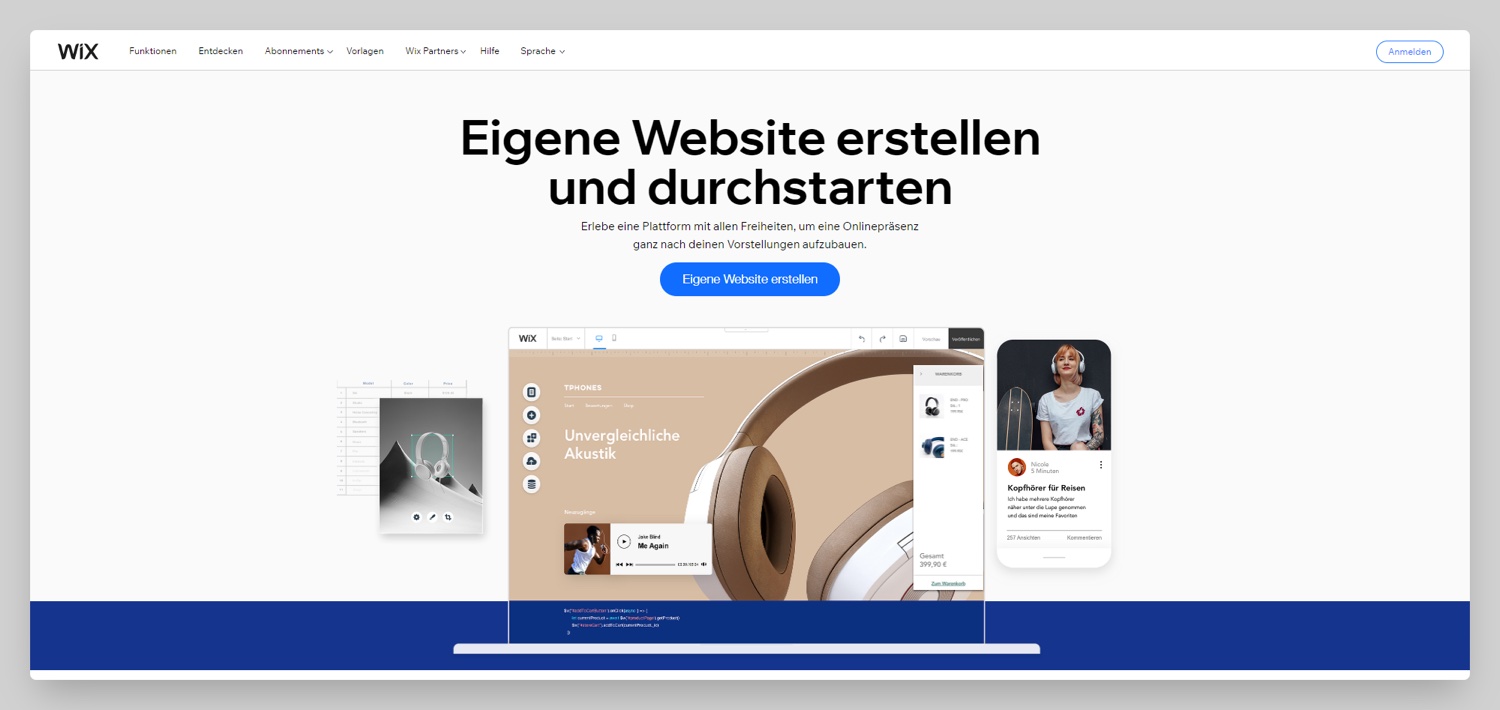
Description
Wix is probably one of the most popular website builders and popular for its simplicity. However, there is not only Wix for websites but also for ecommerce. Here, too, the modular principle is followed, and so you have ready-made templates, images and backgrounds at your disposal.
Pricing
- Business Basic: € 17 / month
- Business Unlimited: € 25 /month
- Business VIP: € 35 /month
Advantages
- List up to 50,000 products
- user-friendly operation
- no technical know-how or large budget necessary
Disadvantages
- from about 50 products your site will slow down significantly
- Pages load basically slowly → negative user experience
- few plugins
Recommended for
- small online shops
- for less tech-savvy entrepreneurs
- suitable for EPUs (sole proprietors)
All 4 online shop systems in a nutshell
Shopify
Setting up an online shop is easy with Shopify, as many themes are already provided. But as it is so often in life, the nice things unfortunately cost more. Nevertheless, Shopify offers you several plugins and integrations, but also a comprehensive checkout system that you can also use for your physical store, for example. This ecommerce platform is therefore ideally suited for SMEs.
WooCommerce
The plugin ecommerce solution is free but for many features additional plugins have to be purchased. This applies for example to the legal protection for the DSGVO or German or Austrian laws (e.g. "WooCommerce Germanized" by Vendidero or "German Market" by Marketpress). WooCommerce can only be used in combination with WordPress and is best suited for entrepreneurs and bloggers who want to add an online shop to their existing website or blog. Basic technical know-how should also be available.
Wix
Wix is also quite affordable and very easy to use. You don't need a lot of technical know-how to create an appealing online shop, but you should be aware that loading your website might take a bit longer and there are fewer plugins available than with other providers. Nevertheless, Wix is suitable for less tech-savvy people with a small online shop.
Shopware
The Starter Edition of Shopware is free and with version 6 the platform has been completely modernized. Shopware was developed together with online shop operators to best meet their needs. Although plugins are quite expensive and internationalization outside Europe is not yet mature, it is definitely a good ecommerce platform for owners of small and medium-sized online shops that want to operate on the Austrian and German markets.
So many offers - What to consider when choosing the right webshop solution?
There are many different reasons to build an online shop. Maybe you are planning a new business and want to be represented mainly on the Austrian and German market? Then Shopware would probably be the better solution for you. Maybe you're a blogger and just want to add an online shop to your existing WordPress website? Then WooCommerce would probably be the right plugin for you. Or you already have a business but want to build an additional digital foothold? Then Shopify with its additional comprehensive checkout system could be interesting for you.
The current but also future requirements for your online shop should be well considered in order to find the right ecommerce platform for you.
For this reason, important factors for choosing the best ecommerce platform:
- your technical knowledge
- the project size
- Your available budget
To make your choice a little easier, one tip would be to make a list of all the points you need from a platform. You should then compare this list with the existing solutions. This is where this interactive quiz from Mollie can help you. After clicking through 7 questions about your webshop needs, you'll be shown the ecommerce solution that best suits you.
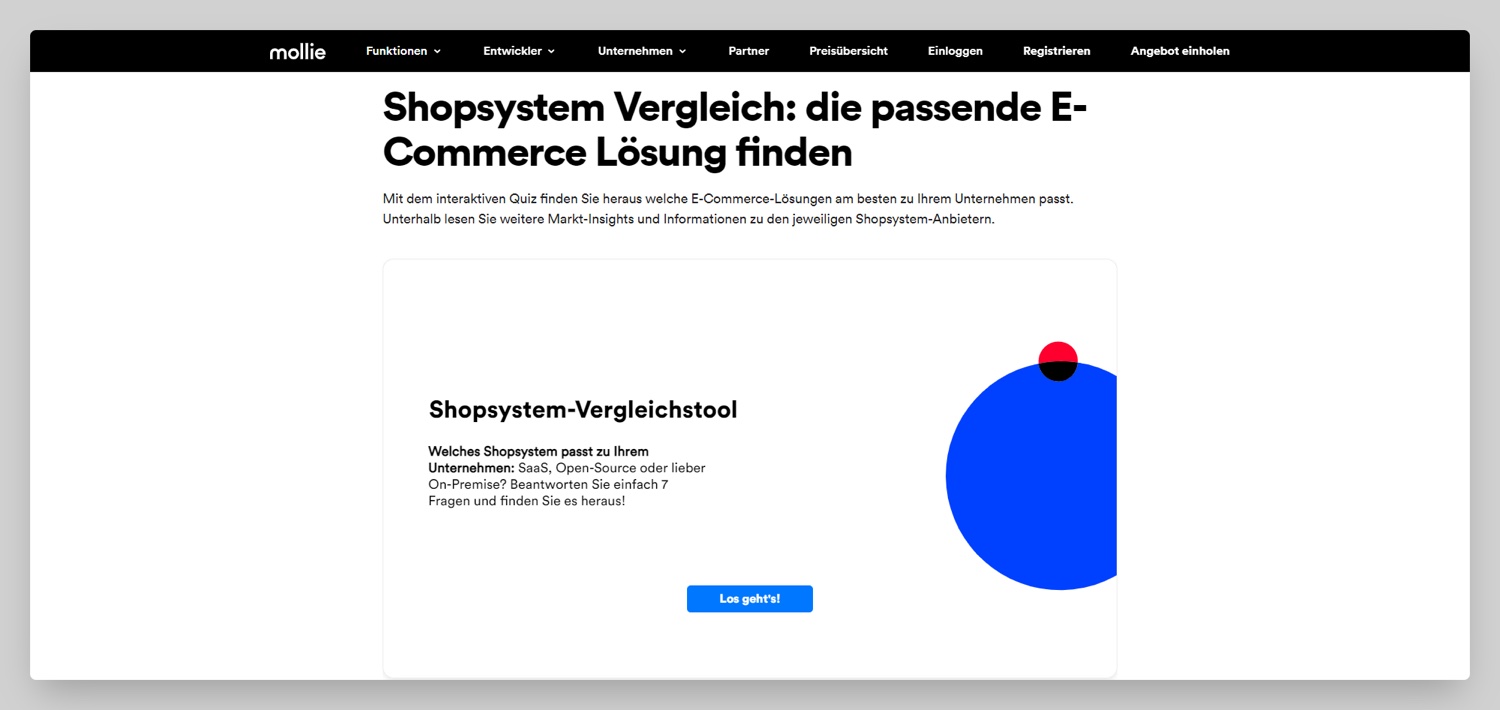
Sources (Last accessed 08.04.2021):
- https://99designs.de/blog/unternehmensressourcen/e-commerce-plattformen/
- https://www.websitetooltester.com/shopsysteme/#Was_ist_eine_E-Commerce-Plattform
- https://www.weclapp.com/de/blog/shopsystem-vergleich/#anker_shopware
- https://sendpulse.com/support/glossary/ecommerce-platform
- https://www.samuelson.de/cloud-loesung-und-on-premises-software/
- https://www.mollie.com/at/shopsystem-guide
More to Explore
Discover more insights from our latest articles
© 2025, Shopstory









